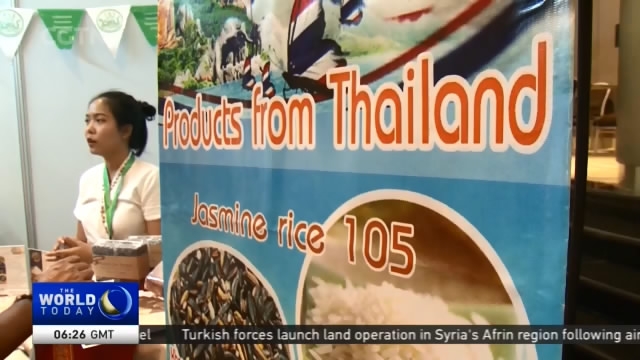
15:10, 22-Jan-2018
Asia Fractured or Not? Overview of 2017 for Davos Fractured World Series

Heads of state and business leaders will meet in Davos tomorrow to discuss creating a shared future in a fractured world. Following various elections in European countries, anxiety regarding a break-up of the eurozone has subsided. However, unrest in the Middle East and the consistent tension on the Korean Peninsula and in ASEAN, now one of the world's biggest economies, have all been mounting pressure over Asia's economic performance. CGTN's correspondents have this joint report.
2017 was a year of continued turmoil in the Middle East that also saw dramatic change in the Gulf and victories over ISIL in Iraq and Syria.
But in Syria and Yemen, Libya, Palestine and Iraq, years-long conflicts continued unresolved.
In the summer of 2017, Iranian and U.S. backed Iraqi, Hezbollah and Kurdish forces and fighters retook Mosul from ISIL following an eight-month campaign that killed tens of thousands and displaced hundreds of thousands of Iraqi civilians.
IBRAHIM IRAQI DISPLACED PERSON "We have no food, no money. I am afraid of them. They hurt me. They hurt my family."
Iraq's success rolled into Syria's campaign to eradicate ISIL. In November, Syria's army declared victory.
Further south in the Gulf, Saudi Crown Prince Mohammed Bin Salman, or "MBS", made waves by introducing dramatic reforms and embargoing GCC member Qatar on the grounds of sponsoring terrorism and supporting Saudi foe Iran.
Iran, meanwhile, spent 2017 on unstable ground as U.S. President Trump emitted a steady stream of anti-Iran rhetoric, threatening to back out of the 2015 Iran nuclear framework deal and reimpose strict sanctions.
CHUCK FREILICH HARVARD BELFER CENTER SR FELLOW "I think we're going to see the region continue to bubble, to be in a state of ferment for decades to come. We just saw a little bit of it in Iran and we'll continue to see it for a long time."
The grand finale: weeks before year's end, President Trump made history by unilaterally declaring Jerusalem as Israel's capital, setting off protests in the Middle East and throughout the world and prompting Palestinian leaders to write off the United States as a peace mediator.
STEPHANIE FREID TEL AVIV "Moving into 2018, the reverberation of that announcement continues ricocheting throughout the region, and beyond. For CGTN this is STEPHANIE FREID in Tel Aviv. Now let's go to my colleague Shane Hahm in Seoul, South Korea."
SHANE HAHM SEOUL "The Korean Peninsula has been a volatile region the past several years to say the least. Nuclear testing and missile launches by the DPRK and threats of military conflict raise concerns about stability in the region. But for South Koreans, it's business as usual.
Residents here have grown accustomed to living so close to the most heavily fortified border in the world. The country is expected to get a big boost when it hosts the Winter Olympic Games this February. Investors here have largely taken into account the geopolitical risks. Credit ratings agencies are closely monitored every time the DPRK conducts a highly provocative act, but evaluations largely remain stable. South Korea's economy did take a big hit last year over its decision to deploy the U.S. THAAD anti-missile defense system. That led the country's largest trading partner China to retaliate through economic measures and hitting South Korea's economy hard, particularly the tourism sector. But as an example of economic integration, the two sides agreed to put the controversy behind them because so much is at stake economically and socially between Seoul and Beijing. Now, South Korea's economy is on the rebound. GDP is forecast to have grown 3.2% last year, exports are on the rise, and domestic consumption is also leading growth. The government is also looking to accelerate spending to create new jobs. And to imagine all this as the prospect of an all-out nuclear war looms over the region. Shane Hahm, CGTN, Seoul. Next we go to my colleague Barnaby Lo in Manila, Philippines."
BARNABY LO MANILA "Asia has been grappling with some of the most contentious geopolitical and security issues of our time, but that doesn't mean that there hasn't been any cooperation among countries in this region. Case in point, the gathering of leaders here in Manila in 2017."
Gatherings, to be more precise, as the Philippines hosted two leaders' summits and one foreign ministers' meeting that gave the Democratic People's Republic of Korea or DPRK a rare chance to assert its position on its nuclear program in an official forum. But while it didn't do anything to pacify concerns.
ROBESPIERRE BOLIVAR PHILIPPINE FOREIGN AFFAIRS DEPT. SPOKESPERSON "ASEAN expresses its grave concern over the escalation of tension in the Korean peninsula, including the DPRK's two nuclear tests in 2016 and subsequent ballistic missile launches."
It was one issue ASEAN member nations could unite on, after years of disagreements over how to handle territorial disputes in the South China Sea. Last year though, a breakthrough, with China and ASEAN finally adopting a framework for a code of conduct.
LI KEQIANG CHINESE PREMIER "It is fair to say that friendly relations between China and ASEAN is a consensus of all ASEAN countries."
Trade between China and individual ASEAN nations have also been growing but now there is a push to bring together ASEAN goods for promotion. Coffee, though not the ASEAN region's most well-known produce, is one.
ROBERT FRANCISCO PHILIPPINE COFFEE BOARD "There are still hunters that are looking for exotic, good coffee, however small of a volume, but exotic, good jewels. And by that being said, they're looking now at ASEAN or Asian countries."
At the same time, exhibits like this also boost trade within the region. ASEAN, after all, is now one of the world's largest economies. Barnaby Lo, CGTN, Manila.

SITEMAP
Copyright © 2018 CGTN. Beijing ICP prepared NO.16065310-3
Copyright © 2018 CGTN. Beijing ICP prepared NO.16065310-3